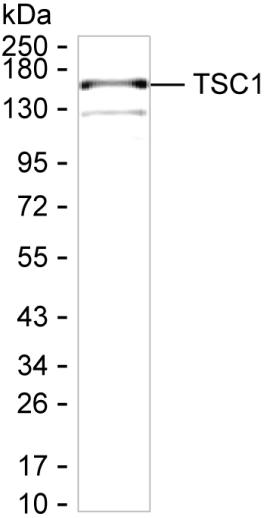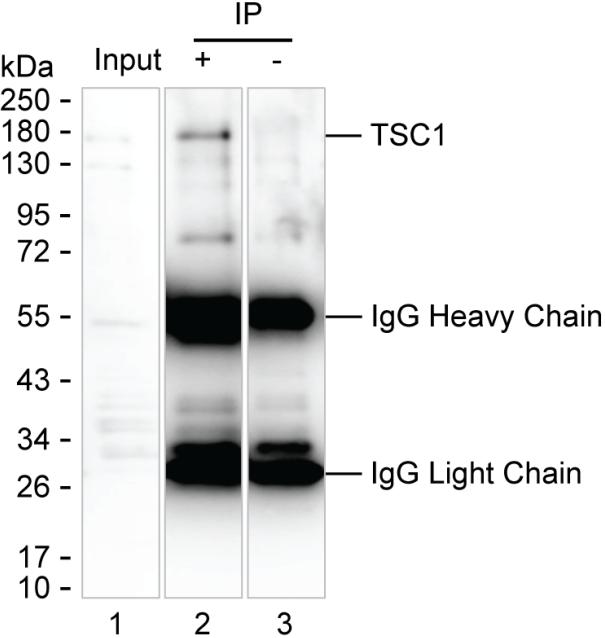

| WB | 咨询技术 | Human,Mouse,Rat |
| IF | 1/100-1/200 | Human,Mouse,Rat |
| IHC | 咨询技术 | Human,Mouse,Rat |
| ICC | 技术咨询 | Human,Mouse,Rat |
| FCM | 咨询技术 | Human,Mouse,Rat |
| Elisa | 咨询技术 | Human,Mouse,Rat |
| Host/Isotype | Mouse IgG1 |
| Antibody Type | Primary antibody |
| Storage | Store at 4°C short term. Aliquot and store at -20°C long term. Avoid freeze/thaw cycles. |
| Species Reactivity | Human |
| Immunogen | Purified recombinant fragment of human TSC1 |
| Formulation | Purified antibody in PBS with 0.05% sodium azide |
+ +
以下是3篇关于TSC1抗体的参考文献,涵盖其在疾病模型、检测方法及信号通路研究中的应用:
---
1. **文献名称**: *"TSC1 Stabilization Enhances Axon Regeneration by mTOR-Independent Mechanisms"*
**作者**: Nieuwenhuis B, et al.
**摘要**: 该研究利用TSC1特异性抗体(克隆号:D7D11)通过Western blot和免疫组化技术,证明TSC1在神经元轴突再生中的作用独立于mTOR通路,揭示了其在神经损伤修复中的新机制。
---
2. **文献名称**: *"Antibody-Based Profiling of Tuberous Sclerosis Complex-Associated Proteins in Human Tissues"*
**作者**: Krueger DA, et al.
**摘要**: 文章系统评估了多种TSC1/TSC2抗体的特异性,比较了不同商业抗体在石蜡包埋组织中的染色效果,为临床病理诊断中抗体的选择提供了实验依据。
---
3. **文献名称**: *"mTOR Signaling Regulation by TSC1 Phosphorylation States in Cancer Cells"*
**作者**: Huang J, Manning BD.
**摘要**: 通过免疫沉淀(IP)结合TSC1抗体(Cell Signaling Technology #4906),研究揭示了TSC1磷酸化状态对mTORC1活性的调控,为癌症靶向治疗提供了分子机制支持。
---
**扩展建议**:若需具体实验方案,可参考抗体厂商(如CST、Abcam)的技术文档,或关注《Journal of Neuroscience Methods》中关于抗体验证的标准化流程。
The TSC1 antibody is a crucial tool in studying the TSC1 protein, encoded by the tuberous sclerosis complex 1 (TSC1) gene. TSC1. along with TSC2. forms a heterodimeric complex that acts as a key regulator of the mTOR (mechanistic target of rapamycin) signaling pathway. This pathway is central to cellular growth, proliferation, and metabolism. Mutations in TSC1 are linked to tuberous sclerosis complex (TSC), a genetic disorder characterized by benign tumor formation in multiple organs, including the brain, kidneys, and skin.
TSC1 antibodies are widely used in research to detect and quantify TSC1 protein expression in tissues or cultured cells. They enable investigations into the protein’s localization, interaction with TSC2. and its role in mTOR pathway suppression under normal and disease conditions. These antibodies are essential for techniques like Western blotting, immunohistochemistry, and immunofluorescence.
In disease models, TSC1 antibodies help elucidate molecular mechanisms underlying TSC-related pathologies and mTOR hyperactivation in cancers or neurological disorders. They also aid in evaluating therapeutic interventions targeting the mTOR pathway. Due to TSC1’s tumor-suppressive function, such antibodies are valuable in both basic research and clinical diagnostics, offering insights into disease progression and potential biomarkers. Their specificity and reliability are critical for advancing understanding of cellular homeostasis and developing targeted therapies.
×